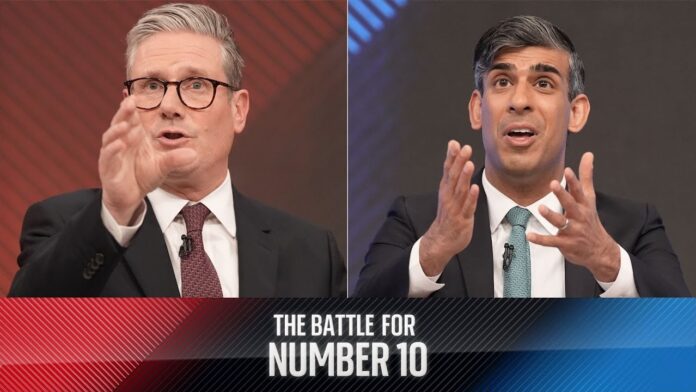Labour Leader emerges as the favoured debater in a televised showdown, setting the stage for election dynamics
In a pivotal moment ahead of the upcoming general election, Keir Starmer, leader of the Labour Party, has secured a resounding victory over Prime Minister Rishi Sunak, according to a snap YouGov poll conducted immediately after a televised debate. The poll revealed that 64% of viewers perceived Starmer to have outperformed Sunak, highlighting a significant shift in public sentiment as the campaign intensifies.
The debate, hosted by Sky News and moderated by political editor Beth Rigby, saw both leaders grilled on critical issues, particularly around taxation and healthcare. Starmer, advocating for economic growth over tax increases, emphasized his commitment to maintaining current tax levels while prioritizing economic expansion. In contrast, Sunak reiterated his party’s stance on lowering taxes for working individuals, underscoring the Conservative agenda of fiscal conservatism and economic stimulus.
One of the standout moments of the debate came when NHS staff shortages were challenged, prompting Sunak to acknowledge decades-long failures in adequately training healthcare professionals domestically, leading to reliance on foreign recruitment. The Prime Minister defended his government’s funding efforts while admitting systemic shortcomings in workforce preparation.
Starmer, seizing on the opportunity to contrast Labour’s approach, pledged to negotiate fair pay with healthcare professionals but questioned the feasibility of the NHS staff’s demand for a 35% wage increase amid fiscal constraints. His responses resonated with the audience, reflecting a nuanced approach to balancing economic priorities with social welfare demands.
The Guardian
Marina Hyde’s satirical commentary on the recent leaders’ event between Keir Starmer and Rishi Sunak offers a humorous yet critical perspective on the spectacle:
Hyde playfully labels Rishi Sunak as “the gaffer,” poking fun at his tendency to commit gaffes, such as awkwardly mentioning his childhood deprivation of a Sky TV subscription during an ITV interview. She ridicules Sunak’s perceived disconnect from everyday concerns, contrasting it with the irony that Sky News, now freely accessible, would have aired his own public faux pas back then.
The event itself, according to Hyde, was hyped up akin to a celebrity gala, with politicians arriving like stars on a red carpet. However, she critiques the format for lacking genuine interaction between the leaders, comparing it to leafing through a furniture catalogue where each participant occasionally shines less than their lectern.
Hyde highlights moments of audience reaction, including laughter at both Sunak’s and Starmer’s statements. One audience member accused Starmer of sounding like a “political robot,” reflecting the challenges politicians face in resonating authentically with voters amid scripted settings.
Concluding with polling data indicating that 64% favoured Starmer over Sunak’s 36%, Hyde underscores the public’s perception of the debate’s outcome. This underscores Sunak’s challenges in effectively presenting himself amidst a structured and performative political landscape.
In essence, Hyde’s satire critiques the staged nature of political debates and the performative aspects of modern campaigning, blending humour with a pointed commentary on electoral dynamics and public perception.
Sky News
In a critical analysis by Sam Coates for Sky News, the recent leaders’ event between Keir Starmer and Rishi Sunak is dissected, revealing stark contrasts in their performances and audience reception.
The event, moderated by Beth Rigby and attended by a 100-strong audience in Grimsby, showcased Starmer’s cautious approach on tax issues, deliberately avoiding commitments on potential post-election tax hikes. This strategic ambiguity aims to mitigate electoral risks but leaves questions about future policies unanswered.
Sunak, on the other hand, faced a challenging night, marred by difficulties defending his record and policies. He struggled to explain his management of national debt and faced audience backlash over rising healthcare waiting lists, attributing blame to junior doctors, a claim met with scepticism. His stance on immigration and Rwanda deportation policies also sparked strong reactions, illustrating disconnects with public sentiments.
The polling aftermath was unequivocal: 64% of respondents favoured Starmer’s performance, signalling a clear win over Sunak’s 36%. Notably, even a third of former Boris Johnson supporters from 2019 saw Starmer as the superior candidate.
For Sunak, this event was pivotal amid a turbulent campaign, but it failed to deliver the transformative momentum he needed. With the general election approaching on July 4th, the question remains whether Sunak can capitalize on future opportunities to reshape his campaign narrative and sway public opinion in his favor.
The Independent
Following a pivotal leaders’ debate on Sky News, Keir Starmer emerged victorious over Rishi Sunak according to a YouGov poll, with 64% of viewers favoring Starmer’s performance compared to 36% for Sunak. The event, moderated by Beth Rigby and held in front of a Grimsby audience, focused on taxation and healthcare among other key issues.
Starmer emphasized his stance against raising taxes, citing concerns about the current tax burden and emphasizing economic growth as his priority. He faced criticism for appearing scripted and was challenged on the affordability of a 35% pay raise for doctors.
Sunak, meanwhile, struggled to defend his record on healthcare staffing and faced scrutiny over rising immigration numbers post-Brexit, which drew audible gasps from the audience. His claims on reducing debt and handling NHS waiting lists were met with scepticism, contributing to a challenging night for the Prime Minister.
The debate underscored contrasting styles and issues for both leaders as they navigate the final stretch of the election campaign. Despite Sunak’s attempts to regain momentum, the event did not deliver the transformative outcome his campaign needed, leaving uncertainties about his ability to sway public opinion before the upcoming election on July 4th.
